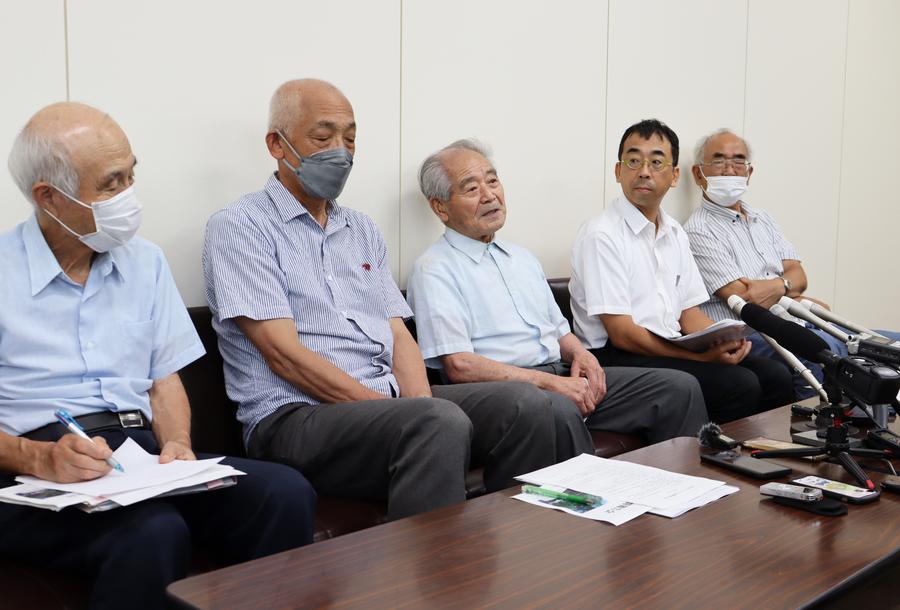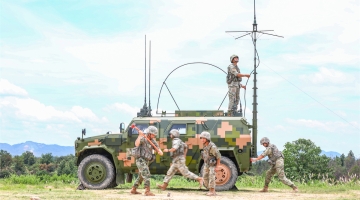
In 2016, Shimizu publicly revealed that he had been a member of Unit 731 Youth Corps, and he has since dedicated himself to telling atrocities committed by the unit and the history to the public.
NAGANO, Japan, Aug. 30 (Xinhua) -- "79 years later, I could finally apologize to the victims of Unit 731," said Hideo Shimizu, a Japanese veteran who served for the notorious Japanese germ warfare army during World War II. "My greatest wish now is for the Japanese government to speak the truth and accurately recount the history of Unit 731."
Now 94 years old, the former Unit 731 Youth Corps member made the remarks during a press conference in Iida City of the central Japanese prefecture of Nagano recently.
From Aug. 12 to 15, Shimizu returned to China for the first time in nearly eight decades, revisiting the site that has haunted him for lifetime, the Japanese bacteriology unit's sprawling complex in the northeastern Chinese city of Harbin, where thousands of Chinese civilians and prisoners of war were killed from the late 1930s to the end of the war.
At the site, he offered remorse and apology to the victims. "My lifelong wish of visiting China to apologize had been fulfilled," Shimizu told the press conference.
He recounted that in Unit 731, he had entered a prison and collected human bones that had not burned out.
"I hope that my repentance and apology can be conveyed to the victims. Even though I have apologized, I could never forgive myself if I find relief in it," Shimizu said.
In 1945, Shimizu served as one of the last young recruits in Unit 731, spending over four months in Harbin.
He recalled that members of Unit 731 were targets of germ experiments, and they could be subject to live dissection if they became infected during experiments.
Shimizu himself was subject to experiment, eating steamed buns contaminated with bacteria, leading to his temperature rising to 42 degrees Celsius and high fever for a week.
After Japan's defeat, Unit 731 destroyed all of its buildings and evidence, with Shimizu participating in the demolition.
In 2016, Shimizu publicly revealed that he had been a member of Unit 731 Youth Corps, and he has since dedicated himself to telling atrocities committed by the unit and the history to the public.
"It was a painful memory," Shimizu said at the press conference. "Now, I do not want to talk about these things. When I think of Chinese victims, I must speak out."
Shimizu was also deeply moved by kindness of the Chinese people, who cared for Japanese war orphans abandoned in China and raised them, and sent them back to Japan.
"Why Japan, living close with China, could not maintain friendly relations with the country?" he said.
Supported by many individuals dedicated to fostering China-Japan friendship, more than 20 doctors from the Osaka Medical Practitioners Association joined Shimizu on his journey to China.
Fumio Hara, a member of the association, said that with the 80th anniversary of Japan's defeat next year, Shimizu's visit to China and the Unit 731 site at the moment is a crucial reminder of how important it is to know about the true history.
In recent years, trend of Japanese militarism has caused anxiety among the Japanese public. Japan's neighbors and the international community are worried about its future path.
Kazuteru Itsubo, who accompanied Shimizu on the trip, said that the visit allowed him to deeply feel Japan's harm to China in the past, and it was essential for the Japanese public to learn about its war crimes in the past.
"I hope for friendship between Japan and China, and no repeat of war," Shimizu said.









